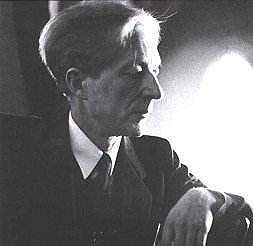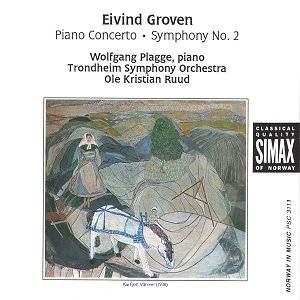The Norwegian composer Eivind Groven is hardly a household
name in this country and, for that matter, neither is Geirr Tveitt,
although the Naxos label is trying its utmost to do something about
the latter injustice. For anyone even partially spellbound by Tveitt,
here is something else well worth investigating. Groven was born in
Lårdal in western Telemark, a part of Norway rich in folk-music
traditions, and was a skilled exponent of both the Hardanger fiddle
and the willow flute. A few of Groven's works have become part of the
standard repertoire of contemporary Norwegian music and the overture
Hjalarljod in particular, commissioned for the 900th anniversary
of the city of Oslo, has achieved widespread popularity. It appeared
on a Philips LP in this country, in the early eighties, but has never,
to my knowledge, made it to CD. The Penguin Guide of the time described
this music, played by the Royal Philharmonic under Per Dreier, as "strongly
diatonic and nationalistic". Groven was steeped, at least as completely
as the aforementioned Tveitt, and also Saeverud, in his native folk
traditions, so it is unsurprising that the various peasant dances of
the region loom large in his inspiration. Slått, Halling and
Springar, all Norwegian specialities, have a part to play in the
genesis of the pieces on this astonishing record.
The second symphony was written between 1939 and 1945
and is subtitled The midnight hour, and these were dark days
indeed for the composer's native land. Although it is less dramatically
immediate than the concerto, it will definitely repay repeated listening
and is neither as melancholy nor as contemplative as might be imagined.
The opening Allegro moderato actually shows some kinship with
Grieg's Symphonic Dances and also recalls some of Tubin's lighter
pieces, whereas the second has a hymn-like quality reminiscent of some
of Carl Nielsen's more reflective moments. In contrast to its predecessor,
the final Allegro dances along to a melody line that resembles
a Nordic folk version of Sussex by the Sea!
The piano concerto was completed in the late forties
but utilises music conceived much earlier, including some boyhood harmonica
motifs! Despite being fairly doggedly non-virtuosic and often using
the lead instrument quite percussively (à la Bartók or,
closer to home, the Vaughan Williams concerto), it nevertheless contains
a plethora of memorable tunes. The second and third movements, in particular,
lodge themselves very firmly in the memory. Although the extended origins
of the piece appear to lie in a literary stimulus (the novella Marihand
by Ingeborg Refling Hagen), the music is more than capable of expressing
itself and the closing movement is one of the most joyous and life-affirming
pieces of music you could ever wish to hear, living up entirely to its
con brio marking. The build up, in the previous two movements
(particularly the central Andante), to this riotous climax is
often quiet and understated but never fails to enchant. Anyone who has
ever driven or walked through the Norwegian fjells in summer,
or indeed anyone who has ever responded to the "songs of the high hills"
will feel totally at home in Groven's musical landscape.
The recording is good and the performances by both
pianist and orchestra, although Trondheim Symphony is hardly in the
luxury class, do the music total justice. The booklet notes, in Norwegian
and English, are as informative as anyone could wish and include numerous
quotations from other Norwegian composers (from the avant-garde Valen
to Tveitt) on Groven's pivotal contribution to their country's musical
life. I cannot recommend this disc too highly.
Neil Horner



![]() See
what else is on offer
See
what else is on offer 